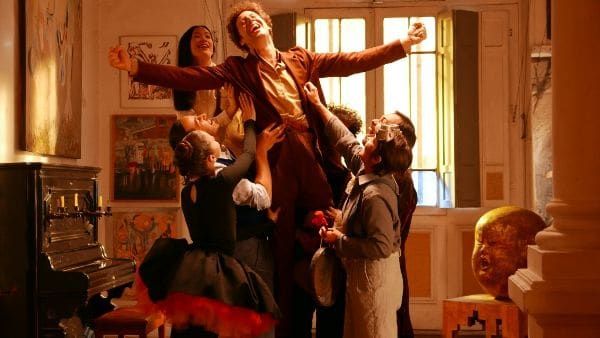Eye For Film >> Movies >> Endless Poetry (2016) Film Review
Endless Poetry
Reviewed by: Jennie Kermode

By the age of 88, most artists are in serious decline, if not actually dead. Alejandro Jodorowsky is in his prime. He may have taken a long break before making 2013's The Dance Of Reality but it, and this sequel, are two of his strongest works to date.
This is not Jodorowsky at his most spectacular nor, one might argue, at his most inventive, but although it grabbed attention, that was never the extent of his talent. Being more accessible need not mean compromising artistic vision, and here it has certainly not led to a compromise in the seductive quality of the images the director employs. Drawing on that particular quality of light that seems unique to Chile, Jodorowsky paints an alluring portrait of his homeland, and of the artistic community it nourished in the Forties and early Fifties, as he tells his own tale.

Picking up more or less where The Dance Of Reality left off, Endless Poetry sees Jeremias Herskovits reprise his role as the young Jodorowsky, with the director's oldest son, Brontis, and Pamela Flores returning as his parents. It opens and closes on a pier and though most key scenes take place indoors, we are never allowed to forget the proximity of the sea, that wider horizon calling to the young artist. He is, as the story begins, at a difficult stage in his life, longing to become a poet, with his father wanting him to go into medicine and telling him that poetry would make him gay - something to be afraid of in a profoundly homophobic culture where relationships between men were then illegal.
Jodorowsky's cousin Ricardo defies these constraints, walking around in a lemon yellow suit with a chihuahua permanently ensconced in the curve of one arm. Though Jodorowsky breaks his heart by rejecting his love, he introduces him to an artists' colony where his poetry is appreciated and he has the freedom to develop his talents. Growing up there (with Herskovits replaced by the director's youngest son, Adan), he prepares for an adult life that will see him become artistically and romantically entangled with some of the country's most celebrated artistic talents as he clumsily searches for a muse and the siren call of the sea grows louder.
If this already sounds incestuous, wait until the scenes where we meet Stella Díaz Varín (Nicanor Parra's Viper) who is played by the same actress who plays the director's mother. In this role she comes across very differently, speaking rather than singing her lines, the violence of her presence deliberately overplayed to highlight the impact she had on the young Jodorowsky's life. Also present as a romantic interest is Pequeñita (Julia Avendaño), who, like Stella, happens to be dating someone whom Jodorowsky admires when they meet. Conflicts around these liaisons raise questions about the ability to live freely without harming others, and emphasise the reactive nature of a young man who is absorbing all the experiences he can whilst searching for his own direction.
Necessarily episodic, the film is given structure by a series of running gags - like Jodorowsky's mother's doomed attempts to please people with cakes - and by repeated reflections on his relationship with his father, who is rarely present but whose views on masculinity and art maintain a haunting presence. In real life the two never reconciled; it is only through the magic of cinema, decades later, that their feud can be brought to an end.
Full of colour and life and characters in whom unreasonableness is presented as a positive asset, Endless Poetry reaches far beyond the director's own life to pay tribute to a generation whose influence continues to shape South America's creative output today. It's hard to imagine anyone else succeeding in capturing the spirit of it all so effectively. Jodorowsky may no longer seem like a rebel, but his voice remains as loud, clear and melodic as ever.
Reviewed on: 22 Jul 2017

















